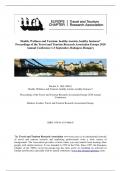Exam (elaborations)
Health and Spa Tourism Business: Tourists’ Profiles and Motivational Factors
- Course
- Institution
Benner, King and Milner (2004) suggested that health tourism is any pleasure-oriented tourism which involves an element of stress relief could be considered to be a form of health tourism. They highlighted the importance of distinguishing between health tourism and the wide phenomenon of tour...
[Show more]



